

Cancer researchers learn more about toxic side effects of new treatments. Big Data and Genomics. I’ve written a lot recently about the rise in genomic data, and the applications being developed on top of this.
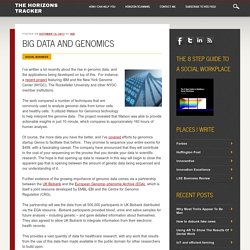
For instance, a recent project featuring IBM and the New York Genome Center (NYGC), The Rockefeller University and other NYGC member institutions. This Hacker is Fighting Big Pharma with Open Source Medicine - Broke-Ass Stuart's Goddamn Website. Why the hype around medical genetics is a public enemy. Science has always issued medical promissory notes.
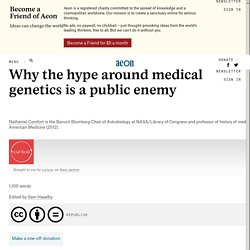
In the 17th century, Francis Bacon promised that an understanding of the true mechanisms of disease would enable us to extend life almost indefinitely; René Descartes thought that 1,000 years sounded reasonable. But no science has been more optimistic, more based on promises, than medical genetics. Recently, I read an article promising that medical genetics will soon deliver ‘a world in which doctors come to their patients and tell them what diseases they are about to have’. Treatments can begin ‘before the patient feels even the first symptoms!’ So promises ‘precision medicine’, which aims to make medicine predictive and personalised through detailed knowledge of the patient’s genome. The thing is, the article is from 1940. Pharma boss: Targeting drugs won’t make healthcare systems more sustainable – EURACTIV.com. “Salami-slicing” the cost of medicines, which represent almost one-fifth of health system budgets and are subject to rigorous value assessments, won’t make healthcare systems more sustainable in the future, Nathalie Moll told EURACTIV.com in an interview.
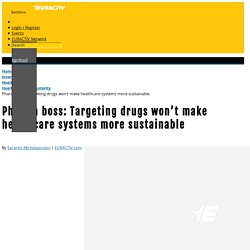
Instead, healthcare systems, which are under pressure from an ageing population and increased prevalence of chronic disease, should be re-oriented towards delivering health outcomes rather than interventions, Moll added. Nathalie Moll is the Director General of the European Federation of Pharmaceutical Industries and Associations (EFPIA). She spoke with EURACTIV’s Sarantis Michalopoulos on the sidelines of the European Health Forum in Gastein. Last June EU health ministers asked the Commission to come up with a report regarding the reexamination of incentives for the pharma industry. Could this impose a potential threat to innovation in the pharmaceuticals sector? BiOspace gives UK startups access to cutting-edge biotechnology - 3D Printing Industry.
The city of Manchester in the UK has opened the doors on BiOspace, the area’s first open access laboratory.
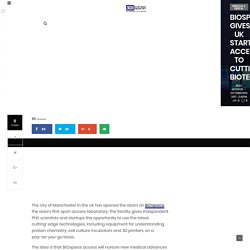
The facility gives independent PhD scientists and startups the opportunity to use the latest cutting-edge technologies, including equipment for understanding protein chemistry, cell culture incubators and 3D printers, on a pay-as-you-go basis. The idea is that BiOspace access will nurture new medical advances past the early research and development stage. Can Artificial Intelligence Advance Rare Disease Treatments? The 7th annual Orphan Drug and Rare Disease conference will be taking place on 18 – 19 October, London, UK and is an event not be missed this year.
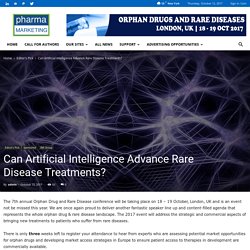
We are once again proud to deliver another fantastic speaker line up and content-filled agenda that represents the whole orphan drug & rare disease landscape. The 2017 event will address the strategic and commercial aspects of bringing new treatments to patients who suffer from rare diseases. There is only three weeks left to register your attendance to hear from experts who are assessing potential market opportunities for orphan drugs and developing market access strategies in Europe to ensure patient access to therapies in development are commercially available. Why harnessing big data technology is a delicate balancing act.
It has been reported that some people are stealing data about tigers in Indian wildlife reserves, raising concerns over data abuse.
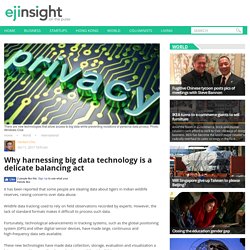
Wildlife data tracking used to rely on field observations recorded by experts. However, the lack of standard formats makes it difficult to process such data. Fortunately, technological advancements in tracking systems, such as the global positioning system (GPS) and other digital sensor devices, have made large, continuous and high-frequency data sets available. HealthPopuli.com. Question: “What is the opposite of ‘patient-centered care?
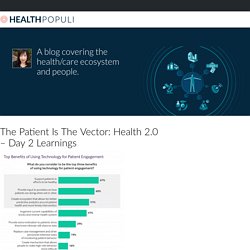
'” asked a panelist on Day 1 of the 11th Annual Health 2.0 Conference. Answer: “‘Physician-centered care.'” Even physicians today see the merits of patient engagement, as this survey from New England Journal of Medicine found earlier this year. Since the launch of the first Health 2.0 Conference in 2007, the patient has played a growing role in session content and, increasingly, on the big stage and panel breakout sessions. A panel I attended on Day 2 convened five developers of patient engagement platforms and digital tools to help healthcare look and feel more like Amazon’s ecommerce, Apple iTunes, Facebook groups, and pleasantly-designed consumer-facing (non-healthcare) apps.
CareCloud demonstrated a multi-feature portal that enables patients to book appointments, pay medical bills, check medication lists, and manage personal information to streamline peoples’ interactions with their doctors’ practices. A Connected Healthcare Life - PharmaVOICE. Three years ago, Verily — then a division of Google X — unveiled its Baseline Project, a collaboration with Duke University and Stanford University to collect health data from healthy people to get a sense of what “normal” looks like.
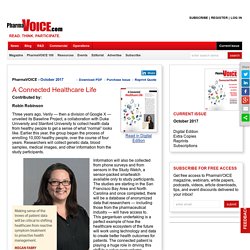
Earlier this year, the group began the process of enrolling 10,000 healthy people, over the course of four years. Researchers will collect genetic data, blood samples, medical images, and other information from the study participants. Why designing patient-centered clinical trials is like conducting an orchestra - MedCity News. Medical 3D Printing Roundup: Slovenia's Symbiolab develops open source Vitaprint bioprinter, two 3D printed spine implants approved. Stem cell and pharmaceutical logistics in Scotland. Biobank, entrepreneur team up to accelerate research into rare disease. Among the experts Wilsey recruited was Rohit Gupta, director of the biobank and clinical research services under Spectrum, the Stanford Center for Clinical and Translational Research and Education.
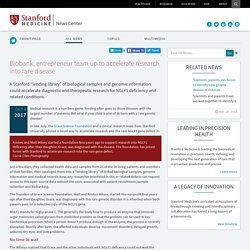
At that time, Gupta was breaking in a new system for storing, tracking and sharing biological samples. He and Gupta brainstormed about how they could join forces and use the new biobank to speed up the slowest and most inefficient phases of any human-subject study: participant recruitment and sample collection. Typically, it takes months to years for a researcher to find enough target patients from whom to collect biological specimens and data. (For many rare diseases, a researcher may never find enough patients to justify starting the analysis phase of a study.)
Is Blockchain Technology the Solution to Health Care's Data Woes? Using Visual Analytics, Big Data Dashboards for Healthcare Insights. eHealth Startup FDNA Introduces Next-Generation Phenotyping (NGP) 5 Examples of Big Data in Healthcare. Transform Healthcare Using Artificial Intelligence and Machine Learning. After the remarkable revolution in the field of information technology now Microsoft is stepping into the world of healthcare to amplify the human ingenuity by using its Artificial Intelligence (AI) technology.
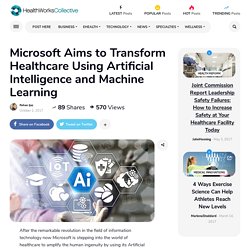
While aiming to transform Healthcare, Microsoft has set up a new healthcare division in its research facility at Cambridge and using the technologies such as cloud computing and machine learning. Microsoft is eyeing on transforming the care continuum rather than just translating, by using the technologies to make professionals more empower, improve the operational effectiveness and to engage the patients in a better way through its cloud platforms and eHealth solutions.
56% of Hospitals Lack Big Data Governance, Analytics Plans. Big Data and Healthcare. Three Fields Proving Biotech is The Healthcare Innovation Powerhouse. Big Data, Machine Learning Can Revamp Provider Health IT Use. A (Big) Data-Driven Approach To Healthcare Innovation. The healthcare industry has experienced much progress in data management and analysis. This includes more than a decade in the large-scale digitization of medical records, as well as the aggregation of research and development in electronic form. In addition, governments have also accelerated the move towards transparency, making stored data more accessible to the industry as a whole. Pharmavoice. The problems healthtech and biotech startups in Australia are solving. New Research Turns Mammalian Cells Into Biocomputers. 56% of Hospitals Lack Big Data Governance, Analytics Plans. Big Data, Machine Learning Can Revamp Provider Health IT Use.
Transform Healthcare Using Artificial Intelligence and Machine Learning. How Patient Portals Improve Patient Engagement. Utah biotech firm to purchase former semiconductor facility. An AI-Driven Genomics Company Is Turning to Drugs - MIT Technology Review. Biohacking & the Rise of Digital Biology. Health technology to address patient ‘no shows’ Blockchain Technology Could Impact How Clinical Laboratories and Pathology Groups Exchange Lab Test Data.
Insurers might use blockchain technology to enable instantaneous verification and interoperability of healthcare records, which could impact clinical laboratory payment systems Medical laboratories and anatomic pathology groups are keenly aware that connected, secure, interoperable health records are critical to smooth, efficient workflows. However, the current often dysfunctional state of health information technology (HIT) in America’s healthcare system often disrupts the security and functionality of information exchange between hospital and ancillary practice patient record systems. Feds want to deal you in on biotech projects. The United States has a powerful set of rules and requirements for new medical procedures and medications, with good reason.